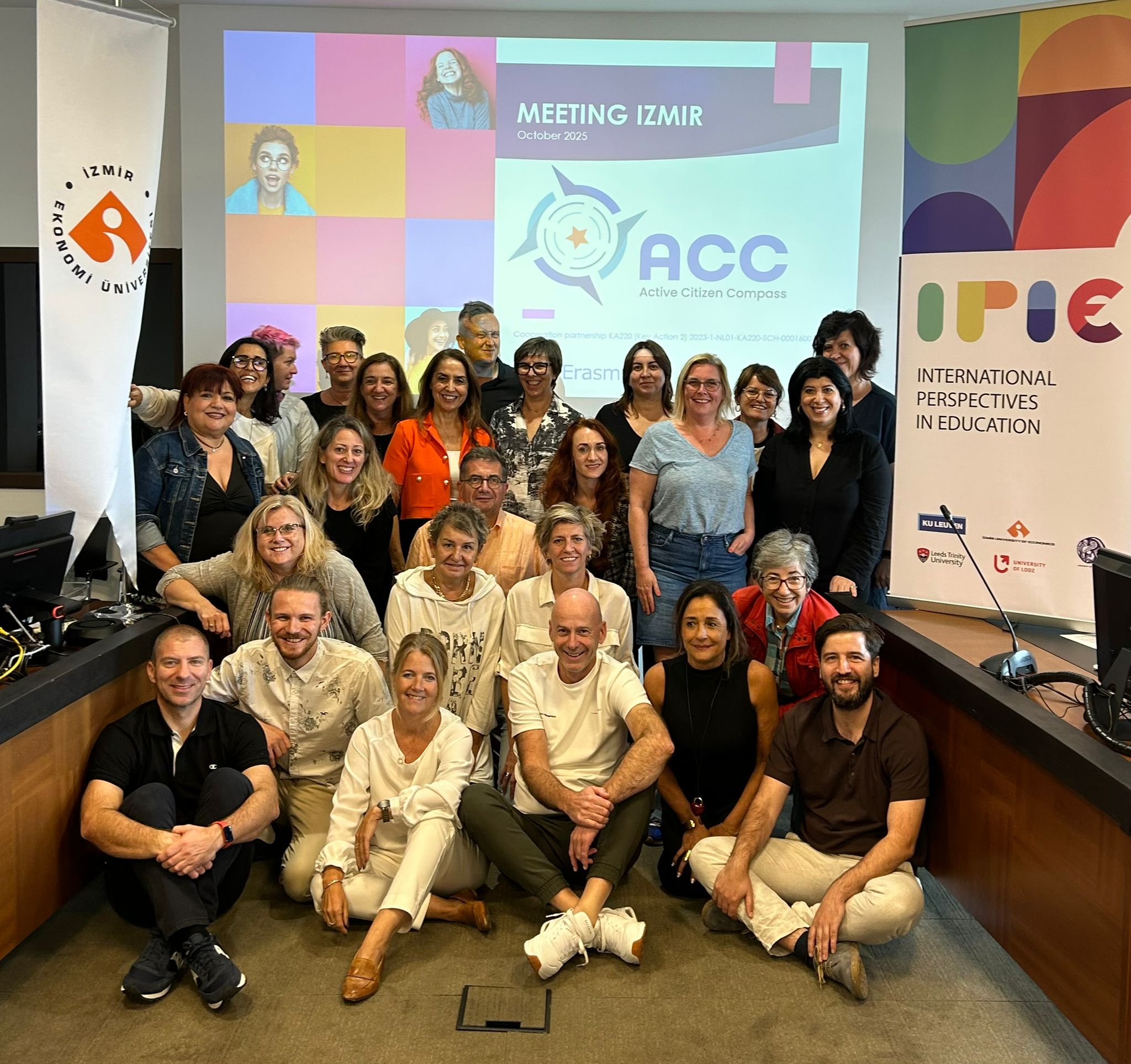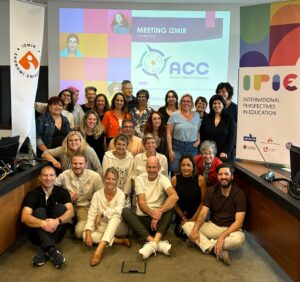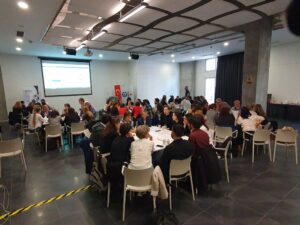
26 okt The neutrality paradox at the heart of active citizenship in European education
Rik Huizinga
20-10-2026
I am working hard to provide a space for multiple values and perspectives in the classroom, but as a teacher what do I do with my own values and perspectives? This question was often raised during the Active Citizenship Compass (ACC) international project meeting on 19/20 October in Izmir. A central activity during this meeting was the development of teaching activities and lesson plans related to active citizenship based on policy guidelines and research-based insights from our studies. Although most of the activities were aimed at fostering a open climate for different opinions among pupils, it remained difficult to come up with a structured approach for the role of the teacher involved. Teachers pointed out they navigate a minefield. Should I be a neutral facilitator or an active discussant with my own perspectives, norms and values.
Figure 1 The ACC team members at Izmir University of Economics ©Oliver Holz
The concern expressed above illustrates that in today’s classrooms across Europe, secondary school teachers face a paradox. On the one hand, they are tasked by education guidelines with stimulating and preparing school pupils to become active, responsible, and democratic citizens. But on the other hand, the teachers are expected to do so in a neutral way, that is without imposing values or political leanings. Yet as Madelijne Koenders has recently argued in the Volkskrant (6-10-2025, Dutch national newspaper), neutrality in citizenship education is an illusion; education is a socialization process, and every decision made by a teacher reflects a system of values. In fact, even staying silent is a moral stance.
Is this an issue, or can teacher positionality be of pedagogical value in the teaching of citizenship?
Neutrality as a myth
Teacher neutrality may sound appealing as it is often considered as a safeguard against indoctrination. Yet in practice, neutrality often silences uncomfortable but necessary conversations about justice, power, and identity. Elevating neutrality as the highest good can be paralyzing and thus unproductive. Such an approach pretends that a value-free stance exists. Teachers who strive for colourlessness risk creating classrooms that are disengaged and detached from lived realities that pupils are exposed to. As a result, this may contribute to reinforcing existing inequalities among secondary school pupils.
Indeed, the very act of teaching citizenship is normative and every pedagogical decision carries moral weight. To teach democracy, one must believe in democracy; to promote participation, one must value engagement. Even the selection of topics – e.g. climate activism, the Gaza conflict, or LGBTQ+ rights – indicates certain priorities and beliefs. When students sense that teachers avoid controversy in the name of neutrality, they might learn that civic issues are unsafe or irrelevant to discuss. Conversely, when teachers disclose their own perspectives while modelling openness and humility, they demonstrate how democratic deliberation works. Neutrality, redefined, should therefore mean holding space for multiple perspectives, not the absence of values.
No view from nowhere
Teacher positionality refers to the way a teacher’s background, beliefs, and social identities shape their practice. This can include their socio-economic status and educational background, political viewpoints and also their gender, sexuality, ethnicity, ability, etc. In active citizenship education, this positionality is inescapable. Teachers are not abstract transmitters of knowledge; they are interpreters, mediators, and role models for their pupils. Their position in and stance towards society inevitably influences classroom dynamics whether it is hopeful or cynical, and critical or conformist. Additionally, Dutch citizenship education operates within a historically pillarized, pluralistic society where religion, ideology, and worldview still structure schooling. The freedom of education means each school may approach citizenship education differently, i.e. Christian, Islamic, humanist, or secular. Thus, positionality is not only individual but institutional. This poses an additional issue for teachers.
The challenge, then, is not to eliminate teacher positionality but to make it pedagogically explicit and ethically reflexive. Teachers must ask themselves: From what standpoint do I speak? Whose voices are amplified or ignored in my lesson plans and my curriculum? And how do my values shape the way I define what ‘good citizenship’ is? Acknowledging one’s positionality does not mean imposing one’s views. Rather, it involves transparency and self-awareness, which are qualities that can deepen students’ understanding of democratic pluralism. The classroom reflects broader social tensions between freedom and authority, or inclusion and exclusion. The moment pupils debate these polarizing topics or bring activism around various topics into school spaces, the boundaries of neutrality are deepened.
Figure 2 Team members discussing new school policy guidelines on active citizenship education ©Ralph de Jong
Of course, our conversations in Izmir also showed that recognizing positionality also exposes tensions. Teachers may face backlash from pupils, parents, management, or other political actors who perceive civic discussions as (too) ideological. For example, the Dutch public debate, as Madelijne Koenders notes, often demands impossible tasks. Teachers are supposed to activate without steering and guide without acknowledging any direction. This climate can lead to self-censorship, where teachers avoid sensitive topics altogether. Moreover, political polarization means that what counts as neutral differs across groups of people and communities. A statement supporting human rights may be read as partisan; a discussion of colonial history as ‘woke.’ The key lies in pedagogical transparency – framing discussions not as indoctrination, but as exercises in democratic reasoning, empathy and solidarity.
Opportunities for action through reflection
Within the ACC project, we believe transparency about positionality in active citizenship education opens powerful pedagogical opportunities by cultivating democratic competences, addressing inequalities, bridging school and society and reflective professionalism. When teachers acknowledge their positionality, they model democratic virtues: honesty, self-reflection, vulnerability and respect for dissent. A teacher who says, “I personally find this policy troubling, but I want to hear your views,” invites dialogue rather than dominance. Such transparency humanizes the teacher and legitimizes student voice. It demonstrates that democracy thrives not on unanimity, but on contested conversation. Students learn that disagreement need not equal disrespect, and that civic identity is negotiated, not imposed.
Figure 3 ACC and Mosaic project members working on new didactic materials on active citizenship ©Vana Chiou
Teacher positionality therefore invites a culture of continuous reflection. Professional learning communities can provide spaces for teachers to discuss ethical dilemmas, biases, and the politics of pedagogy. Teacher education programs must integrate this reflexivity, preparing educators to navigate contested civic terrain with integrity. Teacher education should include modules on ethical decision-making, political literacy, and bias awareness. Teachers must learn to analyse how their social identities such as gender, race, religion, class influence interactions with students and how to engage with this in the classroom for learning purposes. But citizenship cannot be confined to one subject. It requires a shared school culture where dialogue, inclusion, and participation are practiced daily – in governance, conflict resolution, and student voice. School policy should thus enable teachers to engage in substantive civic education, not merely tick boxes. Teachers need freedom to respond to current events without fear of reprimand for their biases.
Courage to teach with values
Active citizenship education stands at a crossroads. On one side lies bureaucratic formalism – a compliance culture that reduces citizenship to checklists and slogans. On the other lies transformative pedagogy – where teachers and students co-create meaning, question assumptions, and act upon shared values. The latter path requires courage. Teachers must resist the myth of neutrality and embrace their role as moral and political agents. Citizenship is an ongoing practice rather than an achievement, and is grounded in empathy, participation, and communication. When teachers embody those principles, they do more than teach democracy. They practice it. Their positionality, far from being a liability, becomes the bridge between formal knowledge and active participation, between the classroom and the outside world.




